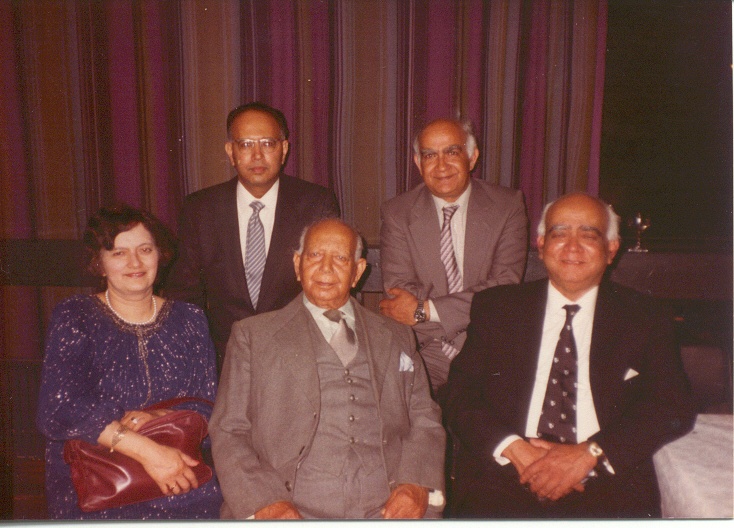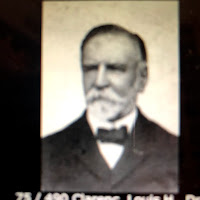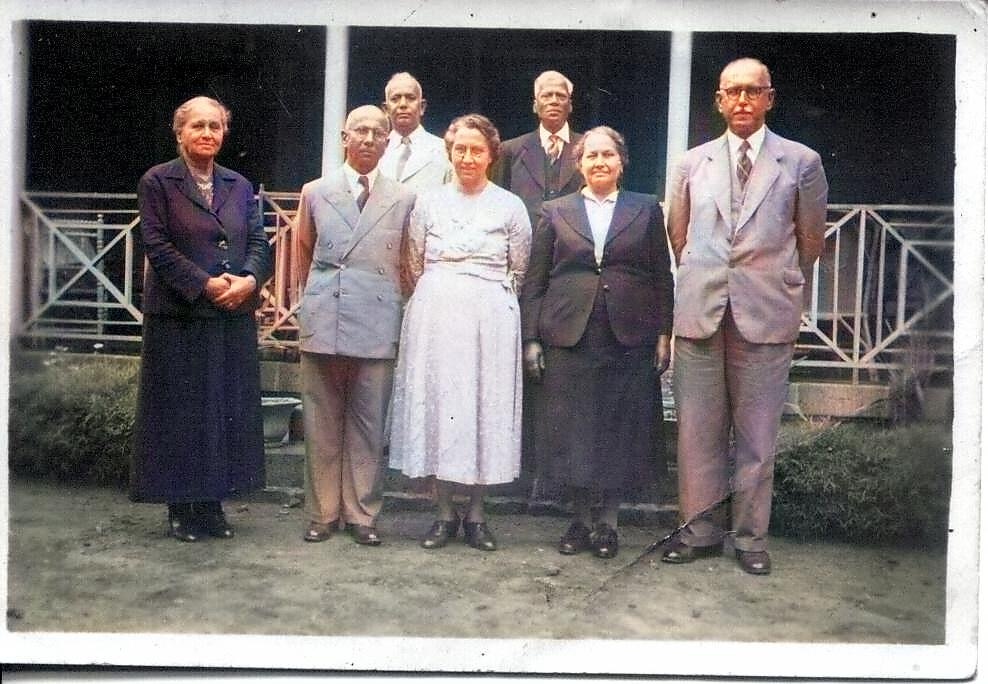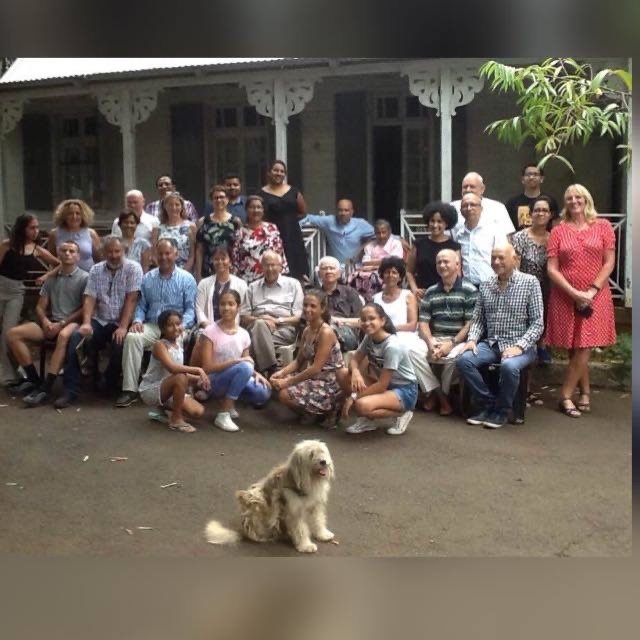So, where are You from? This is a frequently asked question, especially to those of us with dark skin. Usually it is out of genuine curiosity or interest. Sometimes it has a darker motivation. So, I thought I’d like to try to answer the question for me. This is a fairly mechanistic response, rather than a deeper philosophical or spiritual search.
I was born in Mauritius. My name is John Ivan Benett. In that sense I am Mauritian. Mauritians have a confusing way of being called by their second name. As you’ll see further down many were called by their second given names. I moved permanently to the UK when I was ten years old, although we came for about a year when I was four years old. I was given British citizenship at the time of Mauritian independence. I am culturally English. I have a British passport. I also successfully applied for Mauritian citizenship two years ago.
 |
| Mum and Dad wedding photo |
My parents, Yves and Evelyn, met at Southampton University while doing their PGCE. Before long they had married and moved to Mauritius where my father’s family are from. Mum, Evelyn Megan Mary Smith, was English through and through. Fred John Smith, her father, was a plumber, trade unionist and conscientious objector through the last war. He worked in Southampton dock on the war effort. He was a member of the Liberal part. Granny Smith, Ethel, came from Lichfield in the Midlands. Her father was a Stonemason. She stayed at home with her two children Charles and Evelyn. Uncle Charles was married to a flamboyant Dutch woman, aunty Mary. They had four sons, Martin, Rupert, Conrad and Paulus. Conrad has sadly died, so too have Charles and Mary.
Mum was the first in her family to go to University, a beneficiary of the post-war welfare state. She was initially sent to a comprehensive school but showed talent in Mathematics and changed to a Grammar school after a couple of years. She was certainly the first to marry a foreigner and move abroad. I can only speculate about how difficult it must have been for her to make those choices. Perhaps it was easy. They both would say it was the ‘Holy Spirit’ who led them. It was certainly a brave move for those times.
I was born not long after they had settled in Mauritius. Peter, then Heather followed in quick succession. Sheila was born in England during our short return to England when I was four years old. When we were back in England on that occasion, I remember Grandpa conceding that, as Granny would say, ‘all people are made in God’s image and equal in His sight’. I didn’t understand it at the time. I suspect that he had reconciled tensions within himself. It was his way of accepting that he now had mixed race grandchildren.
It is likely that mum had some difficulty adjusting to her new environment. She was uncomfortable having servants. She had been thrown into a different cu
lture and had few friends when they arrived. However, she says she was well supported by Dad’s sisters. Dad says that she was happy and even took up the French and Créole. I’m not so sure, I never saw much evidence of it. Early on she decided to work and soon became head of Mathematics at the Queen Elizabeth College, a prestigious girls’ secondary school in Quatre Bourne. Later in her career, when we moved to Huddersfield, she became a lecturer at the Polytechnic. She got a master’s degree and ended up a Senior Lecturer. She also taught at the University of Manchester. From my mother’s side then, I have strong English working-class roots, liberal politics, and a pro
testant work ethic.
 |
| Rosie, Yves, Grandpère, Marc, Raymond |
Dad was sixth of eight children born to Grandmère Suzanne and Grandpère Raymond Benett. Dad’s two older brothers, first born Raymond (known as Fanfan) and Sylvio (now called Marc), successfully went into medicine. Two older sisters, Denise and Marceline, became teachers. My father also became a teacher, then an academic in Teacher Training and Education. He is rightly proud of his PhD, and publications. He became Reader in Education at the University. He still travels the world helping with education projects in Africa.
Grandpère, Raymond Benett was a descendant of indentured Indians, brought to Mauritius after 1835 following the abolition of slavery. Although technically not slaves, their working conditions were bad and pay was low. They were low status and poor. Grandpère’s family name was Mootialoo. Many regarded him as a wise and shrewd fellow. He seems to have recognised early on that the key to upward social mobility was through education and hard work. Marrying well and Europeanising was also a help. This happened a lot with those aspiring Indians. He trained initially as a psychiatric nurse and progressed as a hospital administrator. His parents were Mr Pothamah Mootialoo and Ms Yaramah Yallappa. He already had a son by his first marriage when he met a young mixed-race woman from a strong Franco-Indian Catholic family.
Marie Suzanne Davis was herself the granddaughter of an Indian servant, Louise Fokeerchand, the concubine of a French doctor, Hector Clarenc. He had several children with her. They took the name Fokeerchand rather than Clarenc. One of them was called Anafeea Marie Madeleine Fokeerchand. She used Marie as her name. She had sisters called Martha (Laffor), Rose (later Derblay) and a brother Louis (Donald). Anafeea Marie married James David Davis formerly Doorgachurn. He was strong Anglican, but they seem to have overcome their denominational differences. Her eldest daughter was Suzanne Marie, my grandmother. Her siblings were, in age order, Simone Lea (Abraham), twins Obrian and Sydney James Davis, Henry Seymour Davis, Eliane Marie (Abrams), Lydia Marie Claire (Marie). To confuse things still further Simone and Eliane married half brothers Edwin Abraham and Stanley Abrams. Their respective offspring are Raymond (Toune) Abraham and Rosemay Abraham; Linsay Davis son of Obrian; Jocelyn and Sylvain Marie sons of Lydie.
The Doorgachurn line can be traced back to Peter Johnson Joylas Doorgachurn. It has been said that he was an Anglo-Indian. He married Marie Anne Dabeesing. Their children had the surname Davis Doorgachurn and included Alexandra; Felix; Lily: Doralis; John: Doudoune: and our own James David Davis Doorgachurn.
 |
| Cemetery with Clarence family plots |
Dr Clarenc was an eminent physician. He is credited for establishing the Alliance
 |
| Stamp showing Clarenc |
 |
| Dr Clarenc |
Changing names seemed to have been De Rigueur, as they may have said in Francophile circles. So was phonetic spelling of made up names. Early on grandpère changed his name from ‘Mootialoo’, to Benett. One ’n’ and two ’t’s. This misspelling has both characterised and complicated our family ever since. Although commonly thought to have been a mistake, I’m not so sure. I’d like to think it was a deliberate thumbing of the nose to the pretentions of inter-racial elitism of the time. Ok, maybe not.
 |
| Marie Davis, Eli Derblay, Rose Derblay, Marthe Laffor, Louis Donald, Raymond Benett, Mr Laffort |
Grandpère met Suzanne while she was in hospital. I believe she had fallen and injured her back. He helped nurse her to health, and they fell in love. It is unclear at that stage whether he was divorced or had changed his name and religion. In any case they were married. It took place in a big black granite Catholic church in Bambous, on the road from Beau Bassin to Flic. There was consternation in Suzanne’s family, since it wasn’t done for ‘French’ people to marry ‘beneath’ themselves. It seems she stood up to her family and got married anyway.
The young couple went off to Rodrigues where uncle (tonton) Raymond was born.
 |
| Suzanne Marie Benett nee Davis |
Suzanne at some stage converted to Seventh Day Adventism (SDA). It isn’t clear when or why that was. Whilst in Rodrigues she had made good friends, several of whom were keen SDA followers. It may have been because of the social aspects of Saturday worship or a theological conviction. Some have speculated that her conversion followed the death of France and a subsequent dispute with the Priest about the fate of unbaptized infants.
 |
| Marie Davis (Fokeerchan), David Davis(Doorgachurn), (?) Suzanne Benett (Davis), Raymond Benett (Funfun), Raymond Benett (Mootialoo), (?) Denise, Yves, Rosie, Marc, Marceline |
Grandpère now got a new job in Montagne Longue. It is also here that Sylvio (he now calls himself Mark) and Dad were born. It sounds like Dad spent a happy carefree time there. The next move was to Candos where Grandpère managed the Victoria Hospital, Quatre-Bourne.
Another son, Georgy, was born seven years after my father. He died the same year. We don’t know why, possibly Diphtheria. Dad was 7 years old. I am unclear what impact this had on the family, but it must have been devastating. Yet no one has ever talked about it. Even in his brief autobiography Dad twice says that nothing significant happened during this time. Finally, Rosie the last born. She seems to have been poorly a lot of the time.
After some years there, Grandpère left Candos, and the family moved to Beau Bassin. This was to enable Silvio and Dad to get the exams to could go to the prestigious Royal College Curepipe. Grandpère took a lower payed job at the psychiatric hospital. The family lived on Rue Henri le Maire, a house which was just along from Rue Mosqué. Grandpère extended the house including la varangue vitrée to accommodate the growing family.
Fanfan won a scholarship to study medicine at Cambridge University and later St Bartholomew’s hospital. He was highly lauded throughout the whole Island. He was the golden boy of the family. No one has ever quite reached his level. Nothing could have validated the social status of this upwardly socially mobile Franco-Indian family more. Indeed, the Indian part of our ancestry was also never referred to until our generation began to enquire about our past.
Denise and Marceline meanwhile, after primary school, went to “secondary ” school of Miss Remy which was not far from where the Rose family later lived at la Rue Telephone. She was sister in law of Dr Remy, another notable doctor on the island. After two years the school closed and they went to L’ecole Tulsi, on Curepipe Rd. Cousins Alice and Rosemay Derblay, descendants on the Fokeerchand side, also attend there. Denise and Marceline then went to Teacher’s Training College for two years to become fully qualified teachers. Grandpère continued to work hard. Marceline reckons Grandpère always said to the girls, “je vous donne votre premier mari”.
Before long Grandpère owned four houses in Beau Bassin. Our house was on Rue Telephone, the Rose’s at 1 Rue Mosqué and 1 Rue Henri le Maire. He also ran a taxi for extra income. One of his houses was in St Martin, just up the road, where he used to live. He gave it to the first son from his previous marriage. St Martin is near Bambous where they got married. Aunty Marceline remembers grandmère taking them for a visit and remembers seeing grandpère’s father. ‘Bien Clair aux yeux gris.’ Dad also remembers this visit quite clearly. Fanfan, was sent to live with Grandpère and Grandmère Davis, Rue Mosqué, to allow him to get on with his schooling.
Much later Suzanne came to live in London while Dad and uncle Sylvio were studying at English Universities. Rosie came with her and must have been only about 15yrs when she left Mauritius. In London she met Peter Towel, married, and they also lived in that house in Finchley, North London on Cornwall Avenue. They had Michael, Tony and Paul all cousins of our age. I remember staying there when Sheila, my youngest sister, was born. Mum and Sheila remained in Haywards Heath with Granny and Grandpa Smith. Many Mauritians would come and go in Cromwell Avenue on their way through. I recall quite distinctly the track at the bottom of the garden. The rhythmical noise of passing trains was strangely comforting to a five-year-old. My memories of the time are mostly happy, although Michael use to frighten us. It was here that Grandmère took to her bed and never really got out again.
We left Mauritius for good in 1965. About six months before that my parents built a modern house in Beau Bassin. Sadly they had to leave it behind. It seems that we lived there a lot longer.
 |
| Me, Peter, Mum with Heather in arms at Flic-enFlac |
In England we lived with Granny and Grandpa Smith on Pentlands Road, Haywards Heath, Sussex for two or three years. Grampa had an allotment which had sustained them through the war. There was also a pig sty, but no longer a pig. We later go a house on Turners Mill Road. We watched the 1966 World Cup Final on a TV bought especially for the occasion. Dad taught in London and commuted. We never got to hear about what it was like, but in his brief autobiography he describes having a happy time at the North London Catholic School. It was while he was there that a school inspector suggested he try his hand at teacher training.
He successfully applied for a job as a lecturer in Huddersfield. He still lives there. Sheila also lives there too with husband Steve. Their children Stewart, Hayley and Greg, are now grown up. Heather and husband Chris have moved back to Sussex after several years in Leeds and Lyon. Their children are Ben, Giselle and Joseph. Peter and wife Kate live in Lytham. Their children are Michael, Sarah, Alex and Jennifer. They too have all left home.
All four of us have become doctors of one sort or another. None of us was overtly coerced into taking this route, but the unconscious pressure is clear from understanding where we come from.
 |
| The extended family on a visit in 2018 |
So, where do I come from? A family of indentured labour and working class; immigrants and illegitimacy; mixed race and changed names. A family of hard work, high aspiration and steeped in religion of one denomination or another. Where we come from is important for context and to understand our values. As my cousin Dave, now a famous photographer and fifth son of Fanfan, said “in this family unless you’re a teacher or a doctor no one wants to know” and that is not far off the mark. I hope our generation has moved on from that view.

No comments:
Post a Comment